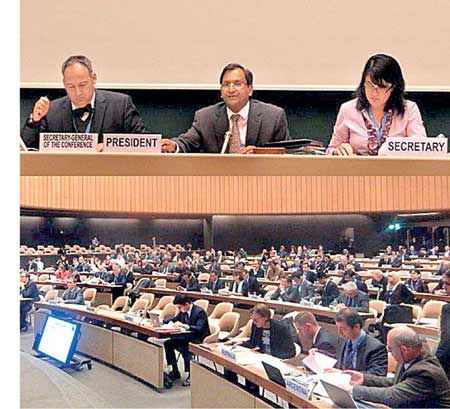Tuesday Feb 17, 2026
Tuesday Feb 17, 2026
Wednesday, 25 November 2015 00:02 - - {{hitsCtrl.values.hits}}
Sri Lanka’s Permanent Representative to the UN in Geneva Ambassador Ravinatha Aryasinha who presided over the 121 member meeting of the High Contracting Parties on the Convention on Certain Conventional Weapons (CCW) has said, “The stepping up of the mandate, to go beyond mere discussions of the possible implications of lethal autonomous weapons systems (LAWS), to requesting States parties to agree on recommendations as to what should be done at the 2016 Fifth Review Conference of the CCW, constitutes an important step forward.” 
The CCW Meeting held over the past week decided to, ‘convene an informal meeting of experts of up to five days during the week of 11 to 15 April 2016 to discuss further the questions related to emerging technologies in the area of lethal autonomous weapons systems (LAWS), in the context of the objectives and purposes of the Convention. The Chairperson of the meeting of experts will submit a report in his personal capacity to the 2016 Fifth Review Conference of High Contracting Parties to the Convention. The meeting of experts may agree by consensus on recommendations for further work for consideration by the 2016 Fifth Review Conference’.
Ambassador Aryasinha, at the opening of the meeting had called on State Parties for an enhancement of the mandate of the meeting of experts on LAWS for next year, to enable a consensus on the subject ahead of the 2016 Fifth Review Conference of the CCW.
Addressing a dedicated discussion within the CCW agenda on Lethal Autonomous Weapons, Sri Lanka’s delegate to the Session Mafusa Lafir, Second Secretary of the Sri Lanka Mission in Geneva, noted that Sri Lanka ‘wishes to see the Convention on Certain Conventional Weapons (CCW) move beyond, where a dialogue among States would be at the centre of any future discussion on Lethal Autonomous Weapons Systems (LAWS), and that such a process will help in ensuring clarity on the concerns of States, as well as to create a matrix of common elements which could be derived from the debate’.
She had noted that the concerns over the concept of ‘dual use technology’ in the nuclear field also has relevance to the issue of LAWS and that it is important to consider safeguards that can help avoid the abuse and unintended consequences of this technology.
Other issues under discussion at the CCW session were the humanitarian impact of anti-vehicle mines (AVM); issues of compliance with the Convention and its Protocols, and the preparations for the Fifth Review Conference on CCW in 2016.
The meeting of experts on LAWS will be chaired by Ambassador Michael Biontino of Germany in April 2016, and the CCW Fifth Review Conference will be presided over by Ambassador Tehmina Janjua of Pakistan in December 2016.